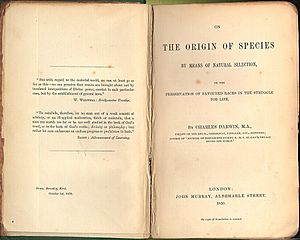The Origin of Species facts for kids
On the Origin of Species is a very famous book written by Charles Darwin. It shared lots of proof for evolution. It also suggested a way that evolution happens, which is called natural selection.
The book's full title was On the origin of species by means of natural selection, or the preservation of favoured races in the struggle for life.
It was first published in London in November 1859. Since then, it has been printed many times and translated into many languages. From its 6th edition in 1872, the title became simply The Origin of Species. This book is super important in biology. Its main ideas are still supported by new research today.
Contents
What the Book Explained
Darwin's book did two big things. First, it showed a lot of evidence that evolution has happened over time. Second, it offered a theory to explain how evolution works. This theory is called natural selection. Understanding evolution by natural selection is key to understanding all of biology and the amazing variety of life on Earth.
What Darwin Didn't Know Yet
Darwin's ideas about natural selection and how traits are passed down (called inheritance) were not totally clear. This was because people didn't know much about genetics back then. Later, in the mid-1900s, scientists combined Darwin's ideas with Gregor Mendel's work on genetics. This showed that evolution can happen in small steps. Darwin also didn't talk much about human evolution in this book. He wrote another book about that later, called The Descent of Man, in 1871.
How the Book Changed Things
The Origin of Species had a big impact. It made many people think differently about how life began. Before this book, religious leaders often shared their views on science. After the book, science slowly became more of a job for professional scientists. Darwin's friend, Thomas Henry Huxley, spent many years supporting Darwin's ideas. He also worked to keep religious ideas separate from scientific research.
Evolution changed all parts of biology. Before Darwin, most biology was about studying nature, often done by people who loved nature as a hobby. After Darwin, most biology was done by trained professionals. The book helped this change by giving a clear explanation for how living things became the way they are.
Darwin's Main Ideas
Darwin had two main goals with his book. He wanted to show that different species were not created separately. He also wanted to show that natural selection was the main reason for changes in species.
Darwin's book showed how selection in nature, caused by the "struggle for existence," is like how people choose certain traits in farm animals or plants.
He used facts from many different areas of science. His goal was to show that his theory could explain many observations from natural history. These observations were hard to understand if each species had been created individually.
What Was Inside the Book
- Chapters 1 & 2: Talked about how much living things can change, both when humans choose traits (like in dog breeds) and in nature.
- Chapters 3 & 4: Explained the "struggle for existence" and natural selection.
- Chapter 5: Looked at how living things change and how traits are passed down (heredity).
- Chapter 6: Discussed some difficulties or questions about his theory.
- Chapter 7: Talked about how instincts are passed down.
- Chapter 8: Discussed if hybrids (like a mule, which is a mix of a horse and a donkey) could have babies.
- Chapters 9 & 10: Looked at the geological record and fossils.
- Chapters 11 & 12: Explained where animals and plants are found around the world (biogeography).
- Chapter 13: Covered how living things are grouped (Classification), how their bodies are built (morphology), how they develop before birth (embryology), and body parts that don't seem to have a use (rudimentary organs).
- Final chapter: Gave a summary and his conclusions.
Later Versions of the Book
Darwin saw six different versions of The Origin published during his life. The second version in 1860 was almost the same as the first. The sixth version was simply titled The origin of species.
Many changes were made in later versions. In the fifth version (1869), Darwin used the phrase 'survival of the fittest' for the first time. This phrase was from Herbert Spencer.
In the sixth and last version, Darwin used the word 'evolution' for the first time in this book. A new chapter 7 was added:
- Miscellaneous objections to the theory of natural selection
During Darwin's life, The Origin was translated into many languages. These included Danish, Dutch, French, German, Hungarian, Italian, Polish, Serbian, Spanish and Swedish. Since then, it has been translated into 18 more languages. Some languages, like French and German, even had more than one translation.
Related pages
See also



